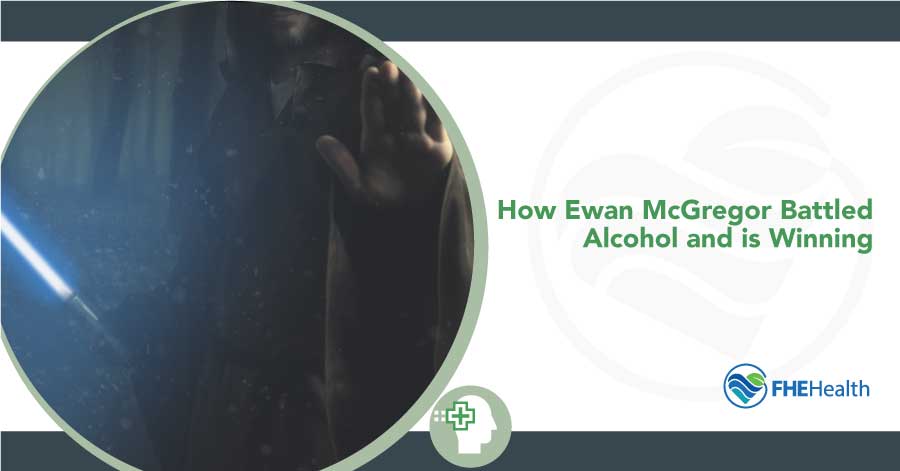
“I drank too much and it made me really unhappy.” – Ewan McGregor
Ewan McGregor is one of today’s most celebrated actors. He’s best known for his roles in films such as Trainspotting, Star Wars: Episodes I, II, and III, Miss Potter, and Moulin Rouge!. Though famous for his acting, McGregor was, at one time, notorious for his drinking. He recalls showing up to sets reeking of alcohol and continuing to drink on work breaks. While his main impetus to get sober was his family, he also knew that he wasn’t happy anymore, and he knew that drinking was the cause.
View this post on Instagram
History of Ewan McGregor’s Life and Career
 Born in Perth, Scotland, Ewan McGregor grew up mainly in the town of Crieff, Scotland. Both of his parents were teachers. McGregor left school at age 16 but later returned to study at the Guildhall School of Music and Drama in London. In 1993, McGregor won an important role in the series Lipstick on Your Collar and then made his film debut the year later. However, it was his role as a heroin addict in Trainspotting that secured international fame for the young actor.
Born in Perth, Scotland, Ewan McGregor grew up mainly in the town of Crieff, Scotland. Both of his parents were teachers. McGregor left school at age 16 but later returned to study at the Guildhall School of Music and Drama in London. In 1993, McGregor won an important role in the series Lipstick on Your Collar and then made his film debut the year later. However, it was his role as a heroin addict in Trainspotting that secured international fame for the young actor.
In Trainspotting, which was released in 1996, McGregor plays a young heroin addict who lives in the suburbs of Edinburgh. McGregor has stated that the role was incredibly important to him and was the role of a lifetime at the time he was asked to play it. In the film, McGregor’s character overdoses on heroin and nearly dies. His character is forced to quit “cold turkey” after his parents lock him in his room, which leads to a profoundly difficult withdrawal process.
The film resonated with the public at the time because it was powerfully true to life. McGregor had not tried heroin at the time and considered doing so for the role, but he decided not to. He did drink, and his use of alcohol may have informed his performance as someone who struggled with substance abuse. He said, “At first I thought, how can you play a heroin addict without having taken it.” After work commenced on the film, however, the actors met with Glasgow heroin addicts and the realities of heroin addiction put McGregor off trying the drug.
McGregor has achieved both commercial and critical success as an actor. He has also done substantial work in theatre and filming documentaries. He has four daughters, including an adopted daughter from Mongolia, with his wife Eve Mavrakis, but filed for divorce in 2018.
McGregor on Mental Health and Substance Abuse
McGregor does have some fond memories of his twenties when he was drinking heavily, partying with the members of Oasis and Blur and largely suffering few repercussions for what he has referred to as “massive debauchery.” He said that he was “a maniac on booze,” and was a “functioning alcoholic.” Although he characterized himself as a “happy drunk,” he said that his drinking eventually led to great unhappiness and that stopping was the one thing that made sense.
McGregor said that he got sucked into alcohol use at a young age. McGregor told Cosmopolitan that “When I was a kid in Scotland, that’s what we did on the weekends. We would meet somewhere and drink, like a lot of kids do, to excess.” After a while, the actor realized that drinking simply wasn’t “fun anymore.” He recalled thinking to himself that he was a husband, father, and actor and that being a drinker simply didn’t fit the trajectory of where his life was headed and where he wanted it to go.
While making the decision to quit was easy, actually doing it was difficult for McGregor. He said he initially worked with a therapist who specialized in alcohol addiction but then transitioned to Alcohol Anonymous. He said relying on counseling sessions and later AA helped him to break his habit, as did the recognition that alcohol was getting in the way of where he wanted to go. It was that notion that continued to fuel his recovery.
After getting sober and staying sober, McGregor said that everything else in his life got easier. It was easier to be the kind of father and husband he wanted to be. He said that sobriety also enhanced his acting career. He was able to focus on new techniques in a way that he had never done while drinking.
View this post on Instagram
Language of ‘An Addict’
McGregor does not typically discuss his alcohol use in terms that addicts often do. He doesn’t refer to it as “a battle” or refer to himself as a “recovering alcoholic.” He believes he was a borderline alcoholic and, though he never appears to have “hit rock bottom,” as many addicts do upon seeking recovery.
McGregor has been sober now for more than a decade. He says that there are days when he misses it— having a few drinks. He says that he can see how it would be nice to unwind over drinks with other actors after a particularly grueling few days of shooting. He says that foregoing this has been among the hardest things he’s ever done. But he recalls how miserable he became when drinking and that if he finds himself in social situations where drink becomes a temptation, he simply goes home. “Simply going home” is not easy for many people in recovery, but McGregor believes his family and new interests kept showing him that sobriety was the right choice.
Celebrities Speaking Out About Substance Abuse and Mental Health
 McGregor has been immensely private when it comes to his personal life and family life, but he has been forthcoming about his drinking past and his decision to get and stay sober. McGregor drank heavily at a time when he was trying to build his career. It was a tumultuous time filled with newfound fame. He got married and had his first child. The stress of his new personal and film roles could have led him deeper into the trappings of fame and substance abuse.
McGregor has been immensely private when it comes to his personal life and family life, but he has been forthcoming about his drinking past and his decision to get and stay sober. McGregor drank heavily at a time when he was trying to build his career. It was a tumultuous time filled with newfound fame. He got married and had his first child. The stress of his new personal and film roles could have led him deeper into the trappings of fame and substance abuse.
Instead, McGregor made a hard choice. Talking about that hard choice can be a way to inspire others to reflect on their drinking and possibly make that hard choice too. McGregor’s story is a particularly inspirational one because it’s a success story. He did it. The tabloids are filled with stories of celebrities whose journey to sobriety is rockier, but McGregor’s story demonstrates that kicking an alcohol habit doesn’t have to be fraught with a series of relapses and subsequent rehab stays. He believes therapy was instrumental in his recovery and he was able to stay on track because of what he learned there.
Giving up his drinking habit didn’t just make McGregor a better actor; though he believes it did. It opened up the world to him; in fact, after giving up drinking, McGregor and his friend went out into the world and decided to fulfill their love of motorcycling across Europe, Asia, Canada, and the U.S. Their journey can be read about in the book Long Way Round. There is also a television series about the journey with the same title. The physical and mental stamina required for that type of journey was all-consuming; he couldn’t have done it if he was still relying on alcohol.
McGregor doesn’t miss alcohol because his life is richer without it. He’s able to embrace new opportunities and is even considering getting his pilot’s license. Recently, McGregor reprised his role as an aging addict in Trainspotting 2. Revisiting the role has helped him view his own former struggles with substance abuse as part of his journey. He’s said, “experience of life is what makes you who you are.” All of his experiences, good and bad, inform who he is. He’s fortunate to really where that journey has taken him.







